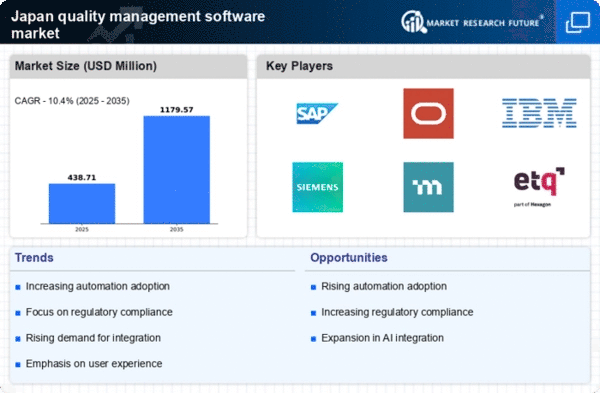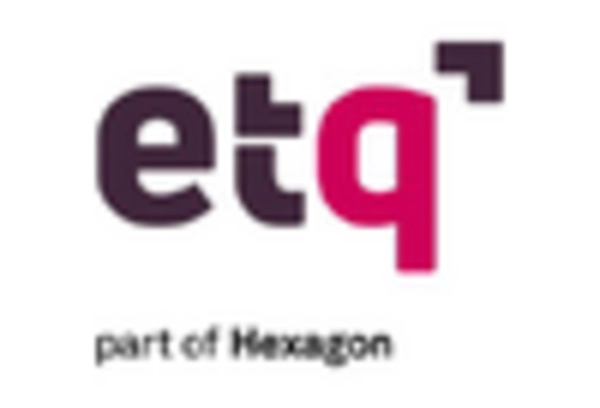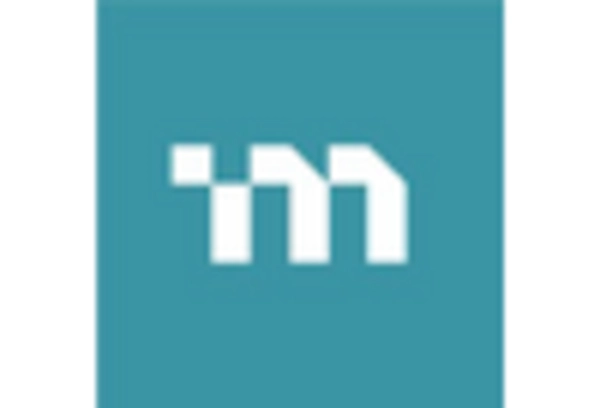Growing Regulatory Pressures
The quality management-software market is significantly influenced by the increasing regulatory pressures faced by businesses in Japan. As industries such as pharmaceuticals, food and beverage, and automotive become more regulated, companies are compelled to adopt quality management software to ensure compliance with stringent standards. The Japanese government has implemented various regulations aimed at enhancing product safety and quality, which necessitates the use of effective quality management systems. In 2025, it is anticipated that compliance-related investments will account for approximately 25% of total spending in the quality management-software market. This trend indicates that organizations are prioritizing software solutions that facilitate adherence to regulatory requirements, thereby driving market growth. The ability to demonstrate compliance not only mitigates risks but also enhances brand reputation, making quality management software an indispensable tool for businesses operating in regulated environments.
Emphasis on Customer Satisfaction
In Japan, the quality management-software market is increasingly shaped by the emphasis on customer satisfaction. Companies are recognizing that delivering high-quality products and services is crucial for retaining customers and gaining a competitive edge. As a result, there is a growing investment in quality management software that enables organizations to monitor customer feedback, track quality metrics, and implement improvements based on customer insights. In 2025, it is projected that customer-centric quality management initiatives will drive approximately 30% of the market's growth. This focus on customer satisfaction not only enhances loyalty but also fosters innovation, as businesses strive to meet evolving consumer expectations. Consequently, quality management software is becoming a vital component of customer experience strategies, further propelling the market's expansion.
Rising Demand for Quality Assurance
The quality management-software market in Japan is experiencing a notable increase in demand driven by the need for enhanced quality assurance across various industries. As companies strive to meet customer expectations and regulatory standards, the adoption of quality management software becomes essential. In 2025, the market is projected to grow at a CAGR of approximately 8.5%, reflecting a shift towards more robust quality control measures. This trend is particularly evident in sectors such as manufacturing and healthcare, where quality assurance is paramount. The emphasis on continuous improvement and operational excellence further propels the need for sophisticated software solutions that can streamline processes and ensure compliance with industry standards. Consequently, organizations are increasingly investing in quality management software to maintain competitiveness and improve overall product quality.
Increased Focus on Data-Driven Decision Making
In the context of the quality management-software market, there is a growing emphasis on data-driven decision making among Japanese enterprises. Organizations are increasingly recognizing the value of data analytics in enhancing quality management processes. By leveraging data insights, companies can identify trends, monitor performance, and implement corrective actions more effectively. This shift is supported by advancements in technology, enabling real-time data collection and analysis. As a result, the market is projected to witness a surge in demand for software solutions that offer robust analytics capabilities. In 2025, it is estimated that around 60% of organizations in Japan will prioritize data-driven approaches in their quality management strategies, thereby driving the growth of the quality management-software market. This trend underscores the importance of integrating analytics into quality management practices to achieve operational excellence.
Technological Advancements in Quality Management
The quality management-software market is witnessing a transformation due to rapid technological advancements. Innovations such as artificial intelligence (AI), machine learning, and the Internet of Things (IoT) are reshaping how quality management processes are executed. In Japan, organizations are increasingly adopting these technologies to enhance their quality management systems, leading to improved efficiency and accuracy. By 2025, it is expected that around 40% of quality management software solutions will incorporate AI-driven features, enabling predictive analytics and automated quality checks. This technological evolution not only streamlines operations but also reduces the likelihood of errors, thereby enhancing overall product quality. As businesses seek to leverage these advancements, the quality management-software market is poised for substantial growth, driven by the demand for innovative solutions that address contemporary quality challenges.
















